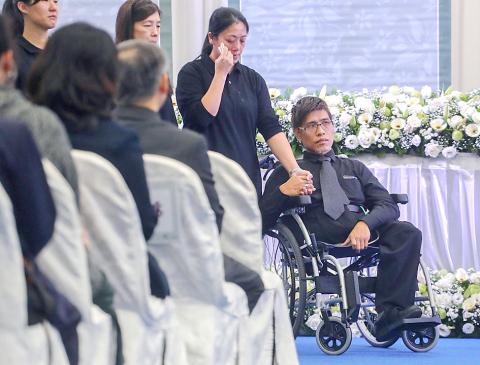A memorial service was held yesterday for Chang Chung-jen (張忠仁), one of the first set of conjoined twins to be successfully separated in Taiwan. He died of a brain hemorrhage on Feb. 2 at age 42.
When Chang and his brother, Chang Chung-i (張忠義), were separated in 1979 after a 12-hour surgery that left each of them with one leg, it was only the fourth time that conjoined twins had been separated anywhere in the world.
Chang Chung-jen on Feb. 1 collapsed at work and died early the next morning, his family said.

Photo: CNA
A memorial concert held in his honor at the First Funeral Parlor in Taipei was attended by several political figures and celebrities, including Presidential Office Secretary-General Chen Chu (陳菊) and former president Ma Ying-jeou (馬英九).
Chang Chung-i said that although his brother has passed away, “his love will always be with us.”
He pledged to continue to spread that love by delivering speeches on his brother’s behalf.
“I really miss you, really miss you very much,” he said through tears.
Chang Chung-i said he could never forget when Chang Chung-jen fell on him and told him not to be afraid during the magnitude 7.6 earthquake that hit Taiwan on Sept. 21, 1999.
Chang Chung-jen loved to paint, and the brothers had intended to this year hold a painting and photography exhibition to mark the 40th anniversary of their separation, Chang Chung-i said, adding that he would work hard to fulfill their dream.
Former National Taiwan University president Chen Wei-chao (陳維昭), who oversaw the twins’ separation and was in charge of their postoperative care, said that the vitality displayed by the brothers went beyond anything he had ever imagined.
He expressed admiration for the brothers, who gave speeches around Taiwan to inspire disadvantaged people.

A Taiwanese software developer has created a generative artificial intelligence (AI) model to help people use AI without exposing sensitive data, project head Huang Chung-hsiao (黃崇校) said yesterday. Huang, a 55-year-old coder leading a US-based team, said that concerns over data privacy and security in popular generative AIs such as ChatGPT and DeepSeek motivated him to develop a personal AI assistant named “Mei.” One of the biggest security flaws with cloud-based algorithms is that users are required to hand over personal information to access the service, giving developers the opportunity to mine user data, he said. For this reason, many government agencies and

The National Fire Agency on Thursday said a series of drills simulating a magnitude 8.5 earthquake would be held in September to enhance the government’s emergency response capabilities. Since earthquakes cannot be predicted, only by continuously promoting disaster prevention measures could Taiwan enhance its resilience to earthquakes, agency Director-General Hsiao Huan-chang (蕭煥章) said in a news release. The exercises would be held to mark annual National Disaster Prevention Day on Sept. 21, the aim of which is to test Taiwan’s preparedness and improve its earthquake resilience in case of a major temblor, Hsiao said. As part of those drills, an earthquake alert would

DEFENSE: The National Security Bureau promised to expand communication and intelligence cooperation with global partners and enhance its strategic analytical skills China has not only increased military exercises and “gray zone” tactics against Taiwan this year, but also continues to recruit military personnel for espionage, the National Security Bureau (NSB) said yesterday in a report to the Legislative Yuan. The bureau submitted the report ahead of NSB Director-General Tsai Ming-yen’s (蔡明彥) appearance before the Foreign and National Defense Committee today. Last year, the Chinese People’s Liberation Army (PLA) conducted “Joint Sword-2024A and B” military exercises targeting Taiwan and carried out 40 combat readiness patrols, the bureau said. In addition, Chinese military aircraft entered Taiwan’s airspace 3,070 times last year, up about

STRICTER ENFORCEMENT: Taipei authorities warned against drunk cycling after a sharp rise in riding under the influence, urging greater public awareness of its illegality Taipei authorities have issued a public warning urging people not to ride bicycles after consuming alcohol, following a sharp rise in riding under the influence (DUI) cases involving bicycles. Five hundred and seven people were charged with DUI last year while riding YouBikes, personal bicycles, or other self-propelled two-wheelers — a fourfold increase from the previous year, data released by the Taipei Police Department’s Traffic Division showed. Of these, 33 cases were considered severe enough to be prosecuted under “offenses against public safety,” the data showed. Under the Road Traffic Management and Penalty Act (道路交通管理處罰條例), bicycles — including YouBikes and other